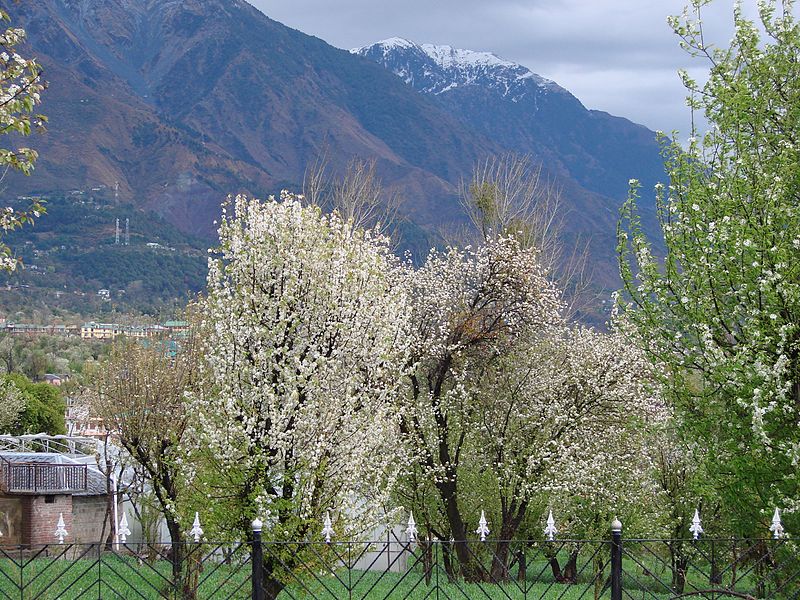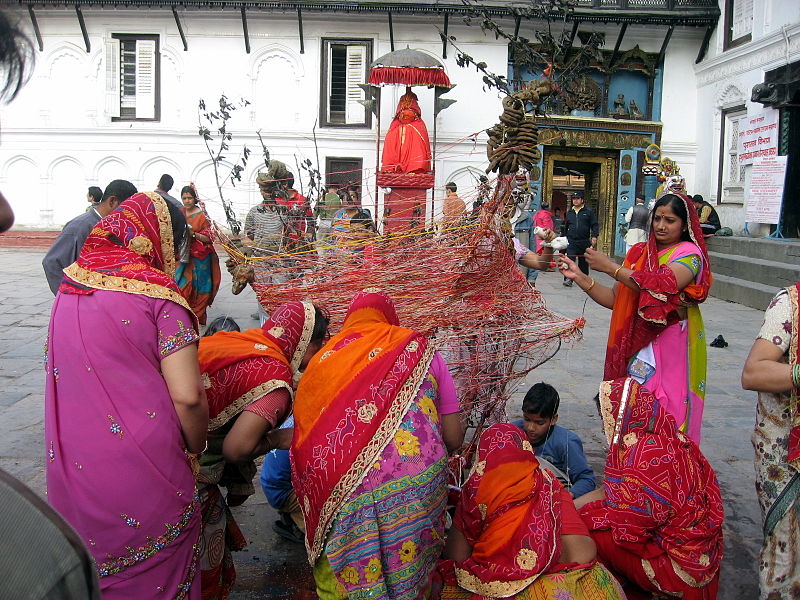Celebrating Spring in Hindi Posted by Rachael on Mar 27, 2019 in Hindi Language
As many of you know, Holi/होली was celebrated by countless people around the world this past Wednesday and Thursday (March 20th-21st). Rather than writing another blog about this festival, which celebrates the arrival of spring, the triumph of good over evil (that is, the ascendance of humility, faithfulness and truth over ego and deception) and the emotions and stages of life that accompany spring – namely youth, love and passion – I wanted to devote this blog to words and phrases that relate to springtime in Hindi. So, without further ado, let’s dive in!
The season of spring is referred to as बसंत/basant or वसंत/vasant in Hindi but, keep in mind that this season coincides with different months than we would assume according to the traditional Hindu calendar (sometimes called Vikram Samvat or Bikrami calendar), which is based on lunar months and solar years. While most businesses and individuals in India are extremely familiar with our Western, Gregorian calendar, certain individuals such as priests in Hindu temples (पुजारी/poojaari) and people celebrating Hindu holidays and ceremonies would naturally refer to the Hindu calendar. It follows that Holi, a traditionally Hindu festival, is celebrated according to the dates assigned to it in the Vikram Samvat calendar in the month of फाल्गुन. You can refer to this helpful table that explains the Hindu calendar below:
| Transliterated Name | Hindi Name | Corresponding Gregorian Months |
|---|---|---|
| Kartik | कार्तिक | mid-October to mid-November |
| Mangsir | मार्ग, मंसिर/अहगन or मार्गशीर्ष | mid-November to mid-December |
| Poush | पौष or पुष/पूस | mid-December to mid-January |
| Magh | माघ | mid-January to mid-February |
| Falgun | फाल्गुन | mid-February to mid-March |
| Chaitra | चैत्र | mid-March to mid-April |
| Baishakh | बैशाख or वैशाख | mid-April to mid-May |
| Jestha | जेष्ठ | mid-May to mid-June |
| Ashadh | आषाढ़ | mid-June to mid-July |
| Shrawan | श्रावण or सावन | mid-July to mid-August |
| Bhadra | भाद्र or भादो | mid-August to mid-September |
| Ashwin | अश्विन or कुआर/क्वार | mid-September to mid-October |
Springtime Vocabulary / बसंत से जुड़ी शब्दावली
- बसंत फूलना (basant phoolnaa, verb): for yellow flowers to bloom (such as mustard flowers/सरसों के फूल) or to turn pale or yellow (in the face). Example: सर्दी ख़त्म होते ही सभी हर एक खेत में बसंत फूलने के मनज़र का इंतज़ार बैचेनी से करते हैं । (As soon as winter ends, everyone waits restlessly for the sight of yellow flowers blooming in every field).
- आँखों में बसंत फूलना (aakhon me basant phoolnaa, idiom): for the eyes to be dazzled (lit. for spring to bloom in the eyes). Example: शादी के दिन, (वह) अपनी होनेवाली बीवी को देखते हुए ऐसा लगा कि उसकी आँखों में बसंत फूल गए । (On the wedding day, while gazing at his wife-to-be it seemed as if his eyes were dazzled).
- उल्लू-बसंत (ullu basant, masc. noun): a complete fool. Example: मैंने तुम्हें बाज़ार से सब्ज़ी ही खरीदने को कहा और क्या वापस लाए – फल?! अरे उल्लू बसंत कहीं के! (I told you just to get vegetables from the market and what did you bring back – fruit?! Oh, what a complete idiot you are!)
- बसंती (basanti, noun): yellow color or yellow garment, like spring flowers, this can also be a woman’s name. Example: होली के लिए वह बसंती सलवार कमीज़ पहने (हुए) थी लेकिन होली खेलना शुरू होते ही उसके कपड़ों का खूबसूरत रंग पूरी तरह बरबाद हो गया । (She wore a yellow shalwar kameez for Holi, but as soon as Holi began (playing Holi began*), her clothes’ lovely color was/became completely ruined.
- होली खेलना (Holi khelnaa, verb): to play Holi (that is, to participate in Holi celebrations by throwing colored powder/गुलाल at people or shooting it, mixed with water, from a water gun called a पिचकारी). Example: कुछ इलाकों में लड़कियों के लिए होली खेलना असुरक्षित हो सकता है तो, आम तौर से, लड़कियाँ अपने रिश्तेदारों और दोस्तों के साथ ही घर के बहुत नज़दीक होली खेलती हैं । (In some areas, playing Holi can be unsafe for girls so, oftentimes, girls play Holi with just their family members and friends close to home).
- होली जलाना (की) (holi jalaanaa (ki), verb): to rejoice at the destruction or end of something (as Hindus rejoice at the burning of Holika on the first day of Holi). Example: उस नौकरी के आख़िरी दिन मैं और मेरे दोस्त दफ़्तर से सीधे बार गए उसकी होली जलाने के लिए । (On the last day of that job, me and my friends went straight to the bar from the office to rejoice that it was over).
- भाँग (bhaang, masc. noun): narcotic drink made from hemp leaves, usually hemp dissolved in milk or yogurt to make a भाँग लस्सी although it can be mixed with water in other foods such as जलेबी. Example: होली के दौरान सभी लोग दूध या दही में भाँग मिलाना पसंद करते हैं और, खास कर के बनारस में, लोग भाँग की जलेबी बनाते हैं – देखने में बहुत ही अजीब लगती हैं ऐसी हरी हरी जलेबियाँ लेकिन स्वाद तो बढ़िया है! (During Holi, everyone likes to mix bhang in milk or curd and, especially in Benares, people make bhang jalebi – such bright green jalebis look very strange but they taste great!)
- हरा हरा सूझना (hara hara soojhnaa, verb): to look always on the bright side. Example: उसकी ज़िंदगी में इतनी सारी दिक्कतें होने पर भी, उसको हमेशा हरा ही हरा सूझता है । (Although his life was filled with difficulties/hardships, he always saw the bright side of everything).
- हरा-भरा (haraa bharaa, adj.): to be luxuriant, overgrown, fruitful, prosperous/happy/radiant (such as a face). Example: उसके बेटे को पहली बार देखते हुए उसका चेहरा एकदम हरा भरा लग रहा था । (Looking at her son for the first time, her face seemed absolutely radiant).
- बाग़ बाग़ होना (baag baag honaa, verb): to be delighted or overjoyed. बाग़=garden, another word for this is बग़ीचा. Example: जब उसको पता चला कि उसको कॉलेज जाने के लिए पैसे मिल गए, तो वह बिल्कुल बाग़ बाग़ हो गया । (When he found out that he got the funds to go to school, he was absolutely overjoyed).

Build vocabulary, practice pronunciation, and more with Transparent Language Online. Available anytime, anywhere, on any device.





